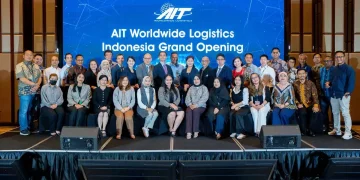AIT Worldwide Logistics has opened its first office in Indonesia, choosing Jakarta as its base. The announcement didn’t come with big headlines or dramatic language, but in the world of Asian logistics, it’s a meaningful move. Indonesia has been gaining weight in supply chains for several years, and for many manufacturers shifting part of their production out of China, the country is becoming a serious alternative rather than a backup option.
For exporters in Indonesia, day-to-day logistics have often felt messy: irregular transit times, customs delays that appear without warning, and too few international players with a real on-the-ground presence. By setting up directly in Jakarta instead of relying on an agent, AIT gives itself the ability to solve problems close to where they happen — whether it’s a shipment stuck in clearance or a last-mile pickup that keeps slipping.
The new office will handle air and ocean freight, customs brokerage, and regional multimodal services. What makes the move more strategic is how it links Indonesia into AIT’s wider Asian network — Singapore, Hong Kong, Shanghai, and the company’s other major hubs. With that setup, cargo can be rerouted or rebalanced more easily when demand swings, something that has become essential given the volatility of recent years.
The timing is hardly accidental. A growing number of electronics, apparel, and automotive suppliers have been spreading their operations across Southeast Asia. Indonesia, with its huge domestic market and rising industrial capacity, has become one of the main beneficiaries of that shift. More volume naturally leads to more pressure on logistics, and shippers have been calling for a more reliable, predictable set of options.
Local industry groups say the arrival of another global forwarder reflects a broader sense of confidence in the country’s long-term trajectory. Indonesia is still a complicated market in many ways — infrastructure gaps, crowded ports, regulatory hurdles — but companies with a clear regional strategy usually view it as a place where early investment pays off.
For customers, the benefit is straightforward: more control, fewer surprises, and the possibility of building steadier supply chains in a region where nothing stays still for very long. For AIT, Jakarta is less a small expansion than a signal that the company wants to be present where the next phase of Asian production is taking shape.























